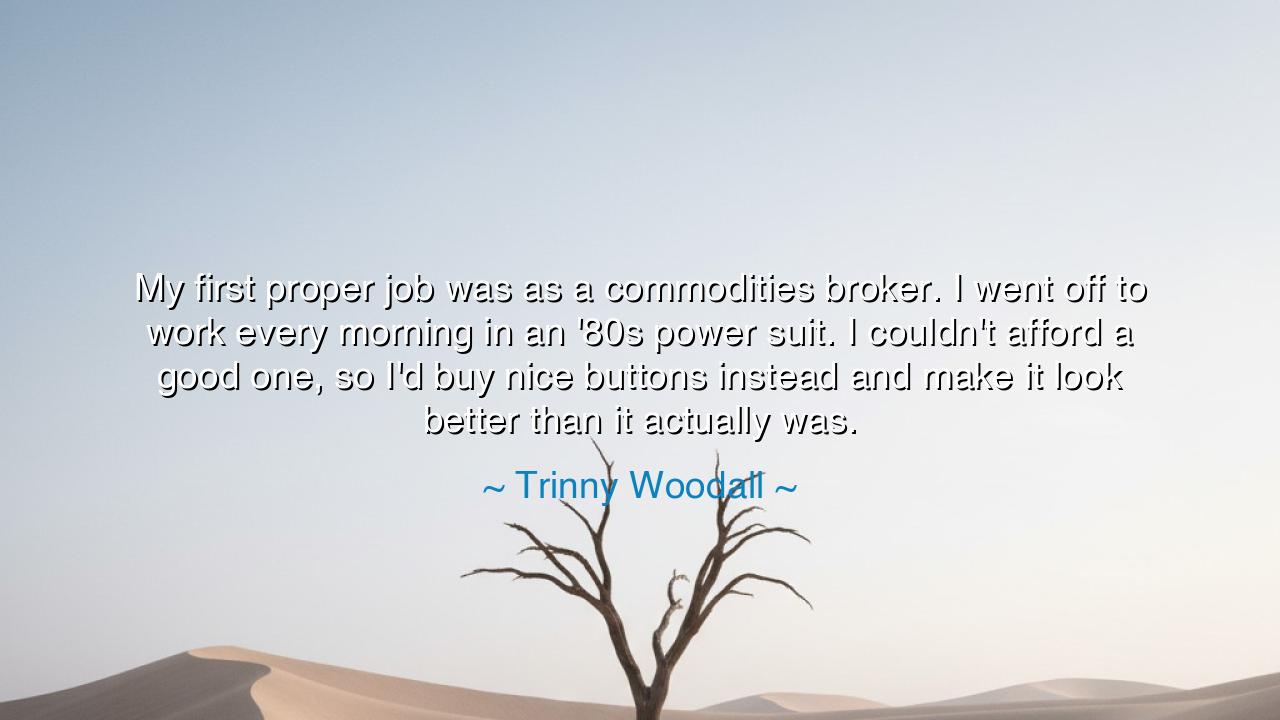
My first proper job was as a commodities broker. I went off to
My first proper job was as a commodities broker. I went off to work every morning in an '80s power suit. I couldn't afford a good one, so I'd buy nice buttons instead and make it look better than it actually was.






In the words of Trinny Woodall, we are given not merely a memory, but a parable for all who labor in the world’s markets and in the realm of appearances. When she says, “My first proper job was as a commodities broker. I went off to work every morning in an '80s power suit. I couldn't afford a good one, so I'd buy nice buttons instead and make it look better than it actually was,” she speaks of more than clothing and commerce. She reveals the eternal struggle between what one possesses and what one projects, between reality and perception, between poverty of means and richness of spirit.
In those days of her youth, the power suit was not simply cloth stitched together. It was a battle armor, a garment declaring ambition, seriousness, and belonging in a world ruled by sharp edges and harsher judgments. Yet she, like many, stood at the threshold with little coin in her hand, unable to command the full regalia of wealth. So she chose buttons, small, shining symbols of transformation. By adorning the imperfect with fragments of beauty, she cloaked herself not in deception but in ingenuity, fashioning strength where none was given.
Consider, then, the tale of Themistocles, the Athenian general. He was not born with gold, nor draped in lineage of kings. Yet, when Athens trembled before the mighty Persian empire, it was Themistocles who counseled the building of ships instead of walls. His city could not afford towering fortresses of stone, but he fashioned a navy—sleek vessels of wood—that carried the hopes of a nation. With cunning, not abundance, he repelled the Persians at Salamis. Just as Trinny sewed buttons to her suit, Themistocles stitched together a defense from scarce resources. Both reveal the ancient wisdom: grandeur is not always given; it is created.
This truth whispers through the ages: a man or woman is not diminished by lack, but by surrender. The world may hand you garments that sag, homes that are bare, or wages that feel like dust. Yet within your grasp lies the ability to elevate the ordinary—to polish, to improve, to add a detail that changes perception and, in turn, opportunity. The power suit may not have been fine, but the buttons gleamed with the fire of resilience.
And let no one say that such effort is vanity. For to present oneself with care is to declare respect for the role one plays in the greater theater of life. The Roman senators knew this well, donning the toga praetexta edged with purple, not merely as fabric but as a sign of office, of dignity, of standing. Even if a man owned little else, the toga conferred upon him the appearance of worthiness, encouraging others to treat him as more than his poverty suggested.
Thus, the lesson for you, O reader, is clear: do not wait for abundance to act with pride. If your table is wooden, polish it until it shines. If your clothes are simple, let them be clean and carefully adorned. If your work is small, perform it with the gravity of kings. In these acts of reverence toward the little you have, you call forth the greater that is yet to come.
Practically, this means: choose one element in your life that seems meager and elevate it. If your living space is humble, set flowers upon the table. If your attire is plain, let your shoes be well-kept or your accessories thoughtfully chosen. If your speech trembles, let your words be prepared and measured. These are the buttons you sew upon your suit. They tell the world—and remind yourself—that within you dwells a soul that refuses to be diminished.
So remember Trinny’s tale, and let it echo in your steps: when you walk into the arenas of life, do not bow your head because your armor is borrowed or imperfect. Stand tall, fasten your buttons, and let even the smallest adornments shine as proof that you have chosen courage over despair, ingenuity over lack, and dignity over defeat. For in such choices, the humble are made mighty, and the overlooked are remembered as heroes.






AAdministratorAdministrator
Welcome, honored guests. Please leave a comment, we will respond soon